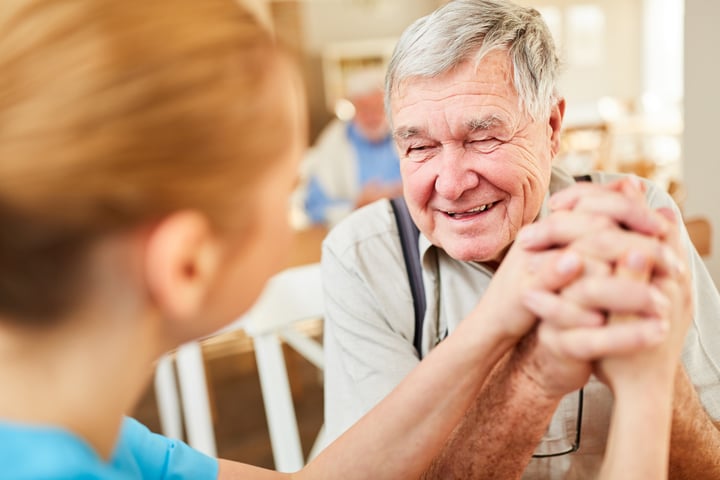
For many people with dementia and their loved ones, there are many unknowns. From the diagnosis to treatment to caregiving, everyone involved is faced with options, which can be overwhelming.
In the past year, many people whose loved ones have dementia have faced additional concerns because of COVID-19. For example, many have wondered if people who have dementia or Alzheimer's are at a higher risk of contracting COVID-19. Likewise, can COVID-19 impact someone’s chances of developing dementia? Let’s dive deeper into these two questions.
Frequently Asked Questions About Dementia & COVID-19
Do those with dementia have a higher risk of getting COVID-19?
The short answer is no. Simply being diagnosed with dementia or Alzheimer’s does not mean that someone is more likely to be diagnosed with COVID-19. However, behaviors related to dementia can impact their chances of infection.
For example, some of the most important things people can do to protect themselves from the coronavirus are washing their hands and wearing masks. People who have dementia can easily forget to wash their hands frequently and leave their mask at home without even thinking about it.
Can COVID-19 worsen dementia?
The answer here is maybe. The vast majority of patients diagnosed with COVID-19 had some sort of neurological symptoms. For some people, this could mean that they’re more likely to develop dementia or Alzheimer’s later in life. If someone who already has dementia contracts the coronavirus, this neurological damage could increase or alter the symptoms of their dementia.
Doctors and researchers are still studying and analyzing these links as we move through the COVID-19 pandemic.
Tips for Dementia Caregivers
The most important thing you can do to protect your loved one and yourself is to avoid getting COVID-19. This means hand washing, wearing masks, limiting time in public whenever possible, getting the vaccine when it becomes available to you, and social distancing as much as you can.
While all of these things may seem obvious to you, it’s also essential to express them to your loved one with dementia as clearly as possible, as it can be easy for them to forget to do them at all or forget why they’re necessary.
Leave reminders around your loved one’s home that can help them follow these good practices. Write a note in the bathroom that reminds them to wash their hands for 20 seconds, or while singing along to a song like “Happy Birthday.” Place extra masks in their purse or coat pockets, or leave extras in your car if they forget when you take them somewhere, like a doctor’s appointment. These little pieces of memory support can be so valuable to your loved one.
You can also think ahead and plan to limit how often your loved one will need to leave their home. Talk to their doctors about prescribing lengthy prescriptions to have more time between visits to refill their medication. Consider their daily care and think about if their adult daycare or other memory care services they use should be modified due to COVID-19.
Create backup plans if you, the caregiver, may become ill or unable to provide care for a certain period of time. Find someone who can fill in for you and have directions and guides written if they can’t get a hold of you. This should include medication lists, daily routines, and any other care specifics someone should know for taking care of your loved one.
COVID-19 has made caring for someone with dementia a little trickier, but there are still plenty of ways to make your daily life easier. Above all, remember to be patient with your loved one. If the coronavirus has frightened you, chances are it has done the same for them on a deeper level.












